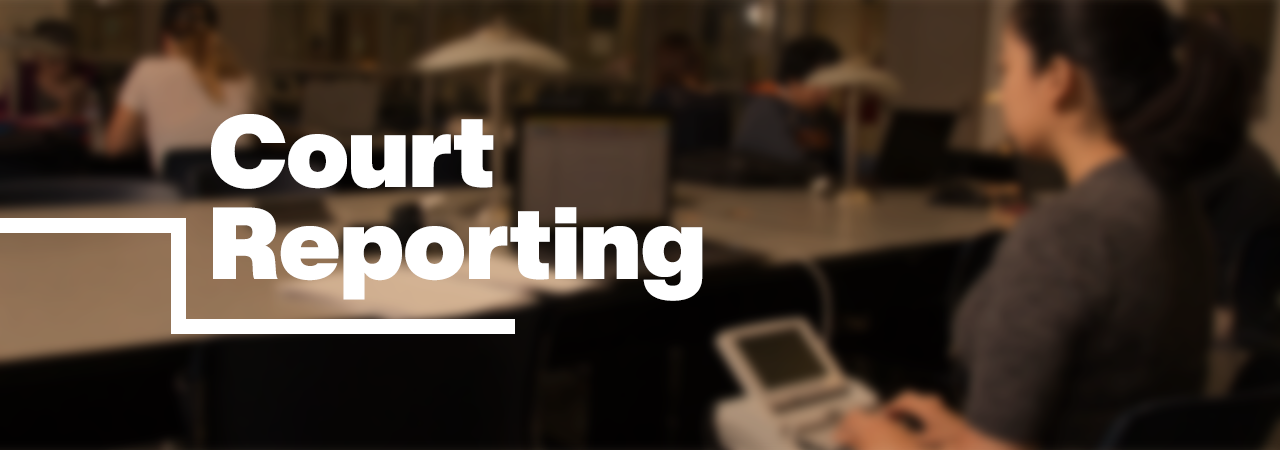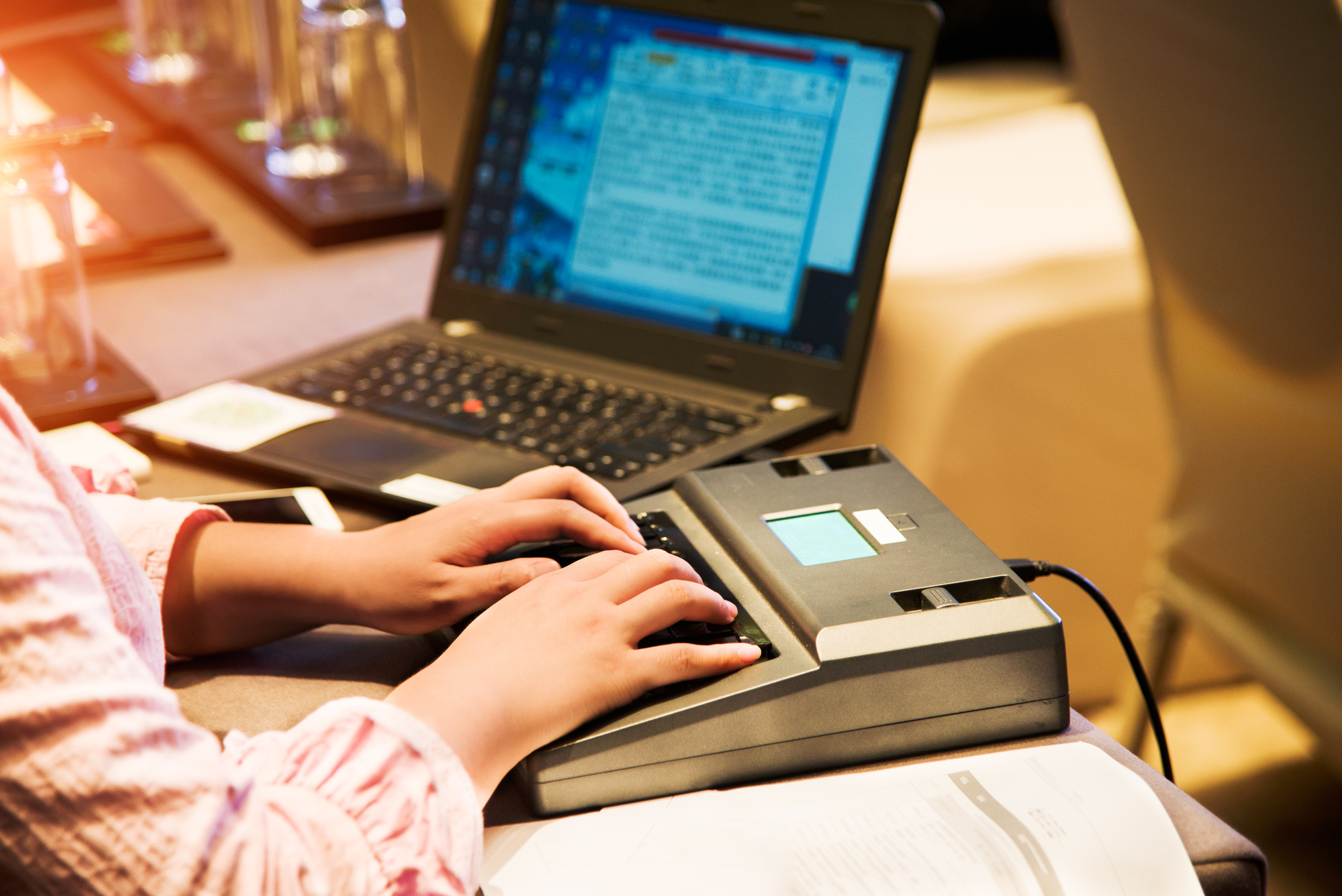Durham court reporting explained: a beginner’s guide
Wiki Article
Exactly How Court Reporting Works: A Step-by-Step Guide to the Legal Process
Court reporting is a vital component of the legal system. It includes a structured process that ensures accurate documentation of proceedings. From preparation to the final distribution of records, each step is crucial. Understanding how court press reporters operate offers insight into the honesty of legal documents. The subtleties of their job can exceptionally affect legal outcomes, motivating concerns concerning the modern technologies and methods they utilize. What are the specific techniques that define this career?The Role of Court Reporters in the Legal System
Court press reporters play an important role in the legal system by providing reputable and accurate transcripts of court procedures. Their job guarantees that every talked word throughout trials, depositions, and hearings is recorded, which is essential for keeping an official document of events. This transcription is basic for appeals, as it enables greater courts to examine the procedures and figure out if any mistakes were made throughout the trial.Additionally, court reporters assist in protecting the honesty of the legal procedure by creating verbatim documents that can be described by legal representatives, courts, and other events included in a situation. They typically make use of customized devices and software application to capture discussion with accuracy. Beyond the court, their transcripts can act as vital historical papers, supplying insight right into judicial proceedings and the lawful system's performance. Inevitably, court reporters contribute substantially to openness and accountability in legal matters.
Getting ready for a Court Reporting Session
Preparation is essential for an effective court reporting session, as it guarantees the precision and performance of the transcription process. Court reporters begin by evaluating case materials, consisting of pleadings and witness checklists, to familiarize themselves with the terms and context. They additionally make sure that they have the essential tools, such as steno devices, note pads, and back-up tools, all set for usage.Prior to the session, interaction with legal groups is vital. Press reporters typically clear up any details requests relating to formatting or favored terminology. Additionally, they may prepare to meet lawyers or witnesses to go over the proceedings and validate the routine. Showing up early to establish up the devices permits fixing possible technical issues. On the whole, thorough preparation not just boosts the press reporter's confidence yet also adds substantially to generating a exact and clear document of the legal procedures.

Catching the Document: Strategies and Devices
Using sophisticated techniques and reputable devices, court press reporters carefully capture the spoken word during legal process. They employ stenography, an approach including a specialized device that enables them to type several noises all at once, thereby transcribing discussion in real time. This machine, known as a steno key-board, is outfitted with secrets that represent words and syllables, enabling swift and accurate input.
Along with stenography, stenotype reporter may utilize audio recording devices as additional tools. These gadgets work as backups, ensuring that no critical details is lost throughout procedures. Some reporters integrate software application that improves their transcription effectiveness, offering attributes such as voice acknowledgment and automated formatting.
Proper positioning and emphasis are paramount; press reporters have to preserve interest on all audio speakers, catching nuances and inflections that add to the record. Via a combination of skill and modern technology, court reporters copyright the honesty of the legal process by guaranteeing a complete and specific document of events.
Transcribing the Proceedings
Recording the proceedings calls for stenotype reporter to transform spoken dialogue right into composed text with remarkable accuracy and speed. This procedure normally happens quickly after the recording has been caught, using specialized software application that enables for smooth transcription. Court press reporters must pay attention attentively to the sound, making certain that every pause, word, and inflection is accurately represented in the transcript.They commonly depend on shorthand systems, personal transcription abilities, and progressed technology to promote this task. The atmosphere in which they function can be fast-paced and in some cases disorderly, as legal procedures usually include numerous speakers and technological lingo. Stenotype reporter need to additionally maintain concentration to capture nuances in tone and context that may be essential for the legal record. Inevitably, the precision of the transcription is critical, as it functions as a main document for future reference in lawful procedures.
Modifying the records and examining
The process of assessing and editing the transcript is essential for making certain accuracy in court reporting. Stenotype reporter frequently work together with attorneys to clarify any uncertainties and verify the correctness of the tape-recorded declarations. This collaboration is his comment is here essential for maintaining the stability of the lawful document.Relevance of Accuracy
Precision functions as the cornerstone of effective court reporting, as even small errors can significantly change the significance of lawful proceedings. The assessing and editing and enhancing process is vital in making certain that transcripts show the talked word with integrity. Court reporters meticulously verify names, technological terms, and legal jargon to maintain precision. This interest to detail helps avoid misconceptions that can affect situation outcomes. Furthermore, precision cultivates trust among lawyers, customers, and the court, enhancing the integrity of the judicial system. Errors can cause disputes or charms, making it imperative for press reporters to refine their work thoroughly. Eventually, the search of accuracy not just enhances the reliability of the transcript but also promotes the standards of the legal career.Partnership With Lawyers
Partnership between stenotype reporter and lawyers is vital throughout the evaluating and editing phase of transcript production. This process ensures that the final record precisely reflects the talked word and sticks to legal requirements. Attorneys usually review transcripts for certain terminology, context, and any type of prospective mistakes that might influence the situation. Court reporters rely upon lawyers' expertise to clarify uncertain sections or highlight vital statements. Reliable communication is vital; lawyers might provide comments or request modifications, which court reporters need to resolve quickly. This partnership not just enhances the quality of the records but additionally adds to a smoother lawful process. Eventually, joint initiatives bring about a accurate and trusted record, important for legal proceedings and future referrals.Supplying the Last Records to Clients
Upon conclusion of the transcription procedure, stenotype reporter meticulously prepare the last record for delivery to their customers. This last transcript undergoes complete proofreading to assure precision, as any kind of errors might substantially impact legal read the article procedures. Court reporters style the record according to the details requirements established forth by the clients or legal companies, including pagination, indexing, and any type of required exhibitions.
Court press reporters might provide a cover letter summing up essential information and using more aid if needed. This comprehensive technique assurances that clients get a refined, precise, and quickly navigable transcript, necessary for their legal requirements.
Often Asked Concerns
What Certifications Are Needed to End Up Being a Stenotype Reporter?
To become a stenotype reporter, people generally require a secondary school diploma, completion of a court reporting program, and accreditation or licensure, relying on state demands. durham court reporting. Effectiveness in shorthand and modern technology is likewise necessary for successThe length of time Does It Take to Complete Court Reporting Training?
Normally, completing court reporting training takes between 18 months to four years, depending upon the program's intensity, the trainee's pace, and the certain requirements of the territory in which they want to practice.
What Is the Average Income of a Court Reporter?
The typical wage of a court press reporter varies by area and experience, commonly ranging from $45,000 to $100,000 yearly (durham court reporting). Elements such as specialization and need can greatly influence their profits in different regionsAre Court Reporters Required to Have Certification?
Stenotype reporter are normally required to acquire qualification, which assures they have the essential abilities and understanding company website for accurate transcription. Accreditation demands can vary by state or territory, showing expert criteria within the legal neighborhood.Can Court Reporters Work From Another Location or Freelance?
Stenotype reporter can work remotely or freelance, giving adaptability in their occupation. Several use technology to record process from different locations, enabling diverse possibilities in the lawful area while maintaining a work-life balance.Court press reporters play a necessary duty in the legal system by giving accurate and trusted transcripts of court procedures. Furthermore, court press reporters help in maintaining the honesty of the lawful process by creating verbatim documents that can be referred to by attorneys, courts, and other events involved in a situation. Utilizing innovative techniques and dependable equipment, court reporters thoroughly catch the spoken word during lawful proceedings. Court press reporters need to likewise preserve focus to capture subtleties in tone and context that might be essential for the lawful record. To end up being a court reporter, people normally require a high institution diploma, conclusion of a court reporting program, and qualification or licensure, depending on state needs.
Report this wiki page